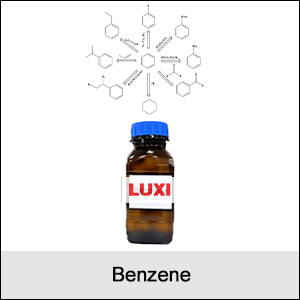Detail
1. Benzene-Derived Products:
(1). Intermediates
A. Ethylbenzene:
Used to produce styrene, a precursor to polystyrene plastics.
Applications: Packaging materials, insulation, and disposable containers.
B. Cumene:
Used to produce phenol and acetone via the cumene process.
Applications: Adhesives, coatings, and epoxy resins.
C. Cyclohexane:
A key intermediate in producing nylon precursors (adipic acid and caprolactam).
Applications: Textiles, engineering plastics.
D. Alkylbenzenes:
Used in detergents and as lubricants.
Applications: Household cleaning products, industrial lubricants.
(2). Polymers
A. Polystyrene:
Derived from styrene (produced via ethylbenzene).
Applications: Packaging, insulation, and consumer products.
B. Nylon and Polyamide Fibers:
Derived from cyclohexane intermediates.
Applications: Textiles, carpets, and industrial materials.
(3). Solvents
A. Toluene (Methylbenzene):
Used as a solvent and precursor for trinitrotoluene (TNT) and benzene derivatives.
Applications: Paint thinners, adhesives, and chemical synthesis.
B. Xylenes:
Includes ortho-, meta-, and para-xylenes.
Applications: Solvents, polyester production, and as a precursor to terephthalic acid.
(4). Specialty Chemicals
A. Aniline:
Produced from benzene via nitration to nitrobenzene and subsequent reduction.
Applications: Polyurethane, dyes, and rubber processing chemicals.
B. Chlorobenzene:
Used in pesticides, herbicides, and as intermediates in chemical synthesis.
C. Nitrobenzene:
Used to produce aniline and as a precursor in the manufacture of dyes.
2. Applications of Benzene-Derived Products:
Plastics and Polymers: Polystyrene, ABS (Acrylonitrile Butadiene Styrene), and polycarbonates.
Textiles: Nylon, polyester, and synthetic fibers.
Pharmaceuticals: Intermediates for drug synthesis.
Pesticides and Agrochemicals: Precursors for herbicides, fungicides, and insecticides.
Paints and Coatings: Solvents and resins.
Automotive: Tires (rubber processing chemicals) and fuel additives.
3. Safety and Environmental Impact:
Toxicity: Benzene is highly toxic and carcinogenic. Prolonged exposure can lead to severe health effects, including leukemia.
Environmental Risks: Benzene is a volatile organic compound (VOC) contributing to air pollution and smog formation. Spillage can contaminate soil and water sources.
Regulations: Benzene use and emissions are strictly regulated to minimize health and environmental risks.



